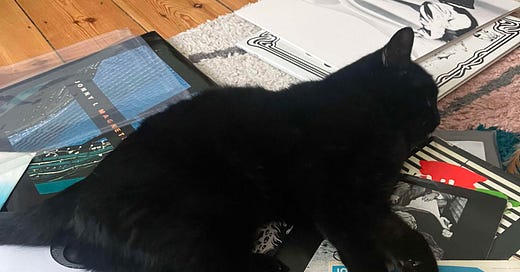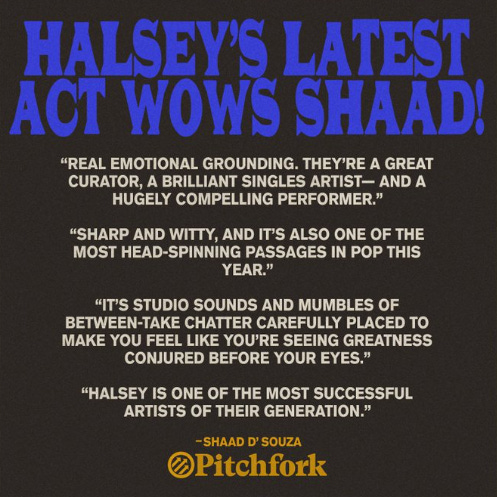The accompanying photo to this post is of my cat, Tiny, rolling around on my record collection while I unearthed some old gems at my family home. Her vinyl flooring (if you will) includes:
Nice ‘N’ Sleazy 7” - The Stranglers (1978)
Visions LP - Grimes (2012)
Kaleidoscope LP - Siouxsie and The Banshees (1980)
LP. 8 - Kelly Lee Owens (2022)
Magnetic LP - Jonny L (1998 - for the techno enjoyers, of which Tiny clearly is. Misspent feline youth, et cetera!)
The photo both warms my heart and acts as a cunning method to attract traffic to my wordsmithery. Time will tell of its success.
The following piece is a rambling discussion on music journalism. I offer no answers to the questions I pose - I just needed to brain dump some thoughts and observations.
The Repressive Desublimation of Critique
I have never listened to Halsey, I don’t really plan on listening to Halsey, but I have found this week’s Pitchfork drama involving Halsey fascinating.
As others have discussed - here and here - the politics of music criticism is a bit awkward. Artists can be victims to negative reviews, and the journalist who wrote the review can be a target of their fan base. Social media has destroyed any barriers that prevent direct online assault, a scary prospect considering the balance of power between a mainstream recording artist against an anonymous and probably low-waged freelance writer. Hydrogen bomb versus coughing baby.
Simultaneous to the Halsey drama was JR Moores’ brutal review of Primal Scream’s new album. As far as I can see it was widely lauded, and this sort of review is true to form of Moores’ general output. It’s a fun read.
I find the optics of it all very interesting. Moores’ past reviews have eviscerated mostly male guitar bands who, presumably, are seen as being able to fend for themselves. As an Idles hater, I found his review of their album Ultra Mono hilarious. Most of my friends didn’t share my enthusiasm.
But Moores’ negative reviews, through artistic license or otherwise, come from a place of skepticism before the music has been listened to. I like this a lot. On the flip side, he largely assesses old white men, and is a white man himself.
Which begs the question - who regulates the space for negative reviews, and who is deemed worthy of having one written about them?
Outside of a moody piece about a Joe Strummer reissue, I have never written a negative review. I would absolutely love to at some point, but I find the energy required for one quite taxing and makes me think I should maybe just listen to stuff I like.
But! The amount of music I’ve received from PRs, agents, labels etc. that I actively did not like but still promoted on my old site was absolutely insane. The churn of ‘jangle pop’ and “slices” of “sun-kissed” indie was utterly relentless. I was so bored of these submissions yet they were totally inescapable.
On the odd chance I’d write a three-star review with some vague criticism of these sorts, it was almost guaranteed the artist would not share it. This was a time-consuming, frustrating process that became tiresome. And I didn’t even enjoy the music!
So, writing negatively garnered little to no attention for my work, and I’m sure it’s the same for everyone else who’s had a fledgling site or blog covering new sounds. In essence, the artist’s willingness to share your feedback dictates the statistical success of your journalism. If it is negative, don’t hold your breath.
I contributed to that ecosystem of praising recycled indie-pop because I didn’t really have much choice. One day I will write a scathing essay about this godforsaken genre, but today is not that day. Maybe I’ll slag off the Geordie Greep album at some point instead. An engagement farming masterclass awaits.
On bigger publications, then, the question of negative reviews becomes a little more complex. Speaking as a casual observer, it seems everything achieves a three or four star review today. Reviewing has, for better or worse, become incredibly friendly and aims to avoid harming the creator.
I think there are two main reasons for this. One is that a lot of music has become so completely autobiographical and introspection-heavy that it can feel like critiques of the music are critiques of the person behind them. Context will always dictate this, but a part of me thinks this is a touch sensitive.
The other is that music reviewing has, to some extent, been taken out of the hands of men and given to a less gate-keeping, more diverse and more inclusive generation of reviewers. This is a good thing. It also means critique is bound to be nicer than its past iterations.
And this is where the conflict lies. The controversy around the Pitchfork (by Shaad D’Souza) and Needle Drop reviews was that they appeared to be scathing to a wounded form of womanhood. The review was okay, but calling a solo artist contemplating their death from chronic illness as suffering from ‘main character syndrome’ is a little bit insane, Mr Fantano.
It’s also something strange to say about any music ever made, to be quite honest. Is it not an implied feature of any solo musician’s output..?
The Pitchfork review is much less biting than I first expected, but Hannah Jocelyn makes a good point in that it seems to dedicate most of its attacks to the PR campaign rather than the album itself.
As Jocelyn says, “If you’re going to hate the record, actually hate the record, tell me why the pain doesn’t come across. Tell me about how artless Halsey’s lyrics can get when they’re trying to be direct. Tell me how uninspired the pastiches are”.
I do think there’s a degree of negative implication in D’Souza’s review that can be picked up without requiring them to explicitly spell out what is bad. But detail would certainly help their case.
Since that 4.8/10 review, D’Souza has been the subject of a disturbing campaign of retribution led by Halsey themself, who shared this graphic to their millions of followers on various outlets.
Name-checking a journalist to a global audience because you don’t like a bad review is also a little bit insane, Ms Halsey. I see she also responded badly to a 6.5/10 review in 2020 - a 6.5! That’s a 2:1!!!
It’s slightly scary, and once again the politics of skeptical journalism become intertwined with the reaction of the artist. At its sterile worst, we reach a point where Taylor Swift’s biographer writes a glowing review in Rolling Stone for her latest album. Nice ‘n’ sleazy does it.
Not to get all neo-Marxist on you, dear reader, but this represents what I’d call a repressive desublimation of critique. Where Herbert Marcuse saw art becoming subsumed, controlled, and made politically ineffective by the state, I worry criticism of major artists is gently becoming regulated by the powerful forces in music, pushed to the point of extreme client journalism and simultaneous punishment by artists onto nay-sayers of their work.
This is not to say criticism is in essence a force of effectiveness per se, but rather its space within the musical sphere is diminishing as a result of these factors. Rebellion, if you can call it that, can lead to a very public form of ostracisation.
So I return to my earlier questions with an addition. Who regulates negative critique, who is deemed worthy of receiving it, and who is able to take it? I get the sense too much power has been given to artists in this regard. We all want positive spaces of discussion, but when criticising art brings the risk of collective retaliation where is the motivation to do that?
My main takeaway is that - shock horror! - there are levels of gendered patronisation within the Halsey reviews (mainly by Fantano) that reek of a male-oriented journalism of days gone by.
I am also worried that this sort of critique, when levelled successfully, is still centred within a male space - both writer and recipient are readily accepted as more deserving of this critical conversation. And, of course, that major artists’ power over journalists, in various forms, is discomforting.
Maybe every small blog writer should go all guns blazing, writing a continuous stream of one star reviews as they work their way up to the top of the food chain. Reset the balance of power through psychological warfare of young artists before taking it to the chart-toppers. That’ll do it.
I don’t have the answers. All of this seems to be a huge symptom of our constant online presence, where with a touch of a screen a piece can be uploaded, and with another a fanbase can be called to fight back. Or, alternatively, a music journalist spends their time writing three and four star reviews with little consequence for all involved. Neither of these are enticing prospects.
This interrogation went on for a lot longer than expected. I wanted to write a love letter to Grouper’s album A I A: Alien Observer, but I will save that for a less dense article.
Thank you for reaching the end of the piece, kemosabe. Now go and talk to your family about Marcusian theory in regards to music journalism. They’ll love you for it!





